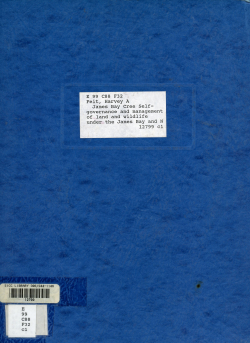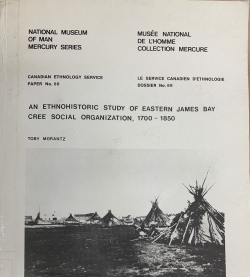Sovereign injustice : forcible inclusion of the James Bay Crees and Cree territory into a sovereign Québec

Type
Book
Authors
ISBN 10
0968019102
ISBN 13
9780968019108
Category
General Library Collection
[ Browse Items ]
Publication Year
1995
Publisher
Pages
494
Subject
Cree -- Québec (Province) -- Government relations
Tags
Cree -- Québec (Province) -- Government relations, Cree -- Government relations, Cree -- Québec (Province), Cree, Québec (Province), Indigenous peoples -- Legal status laws etc. -- Québec (Province), Indigenous peoples -- Legal status laws etc., Québec (Province) -- Politics and government -- 1960, Québec (Province) -- Politics and government, Sovereignty, James Bay and Northern Quebec Agreement, Indigenous peoples -- Government relations
Abstract
"The James Bay Crees recent successful battle to prevent the destruction of the Great Whale River through hydro-electric development has brought them to national and international prominence. Long-time participants in the struggle for recognition of Aboriginal rights, the Crees are now increasingly defending and asserting their Aboriginal and other human rights in the Canadian and international context.
This study undertakes an incisive analysis of Cree status and rights in the present Canadian context. The Grand Council of the Crees makes a strong case for Aboriginal self-determination, and also assails the possible forcible inclusion of the Crees - and Eeyou Astchee, the Cree's traditional territory - into any future independent Québec.
This definitive and timely work is of great relevance in the context of Québec separatism. It is also a major and lasting contribution to an understanding of one of the most pressing questions facing all Canadians today: just accommodation of rights, status and aspiration of all Aboriginal peoples in Canada."--Back cover.
This study undertakes an incisive analysis of Cree status and rights in the present Canadian context. The Grand Council of the Crees makes a strong case for Aboriginal self-determination, and also assails the possible forcible inclusion of the Crees - and Eeyou Astchee, the Cree's traditional territory - into any future independent Québec.
This definitive and timely work is of great relevance in the context of Québec separatism. It is also a major and lasting contribution to an understanding of one of the most pressing questions facing all Canadians today: just accommodation of rights, status and aspiration of all Aboriginal peoples in Canada."--Back cover.
Description
494 pages : color map ; 28 cm.
Biblio Notes
Contents:
Introduction
1. Who are"people" with the right to self-determination?
1.1 Aboriginal peoples as distinct "peoples"
1.2 Quebecers as a distinct "people"
1.3 Can aboriginal peoples be forcibly included as part of the "Québec people" for secession purposes?
2. Self-determination and the right to secede
2.1 Right to self-determination of aboriginal peoples
2.2 Recognition of self-determination not a precedent for a right to secede
2.3 Self-determination
the right to choose
3. Québec's secession attempt
on what basis is it justifiable?
3.1 Canadian Constitution
no right to unilaterally secede
3.1.1 Has a constitutional convention been established in regard to the unilateral secession of Québec?
3.2 Internal self-determination of Quebecers
3.3 PQ strategy to undermine the functioning of the Canadian Federation
3.4 International law
no right of Québec to secede
3.4.1 Key distinctions between Québec and former Yugoslavia
3.4.2 Key distinctions between Québec and Baltic states
3.5 Need for informed discussion prior to referendm vote
3.5.1 Attempts to suppress free and open debate
3.5.2 Need to clarify basis for PQ government's unilateral declaration of independence
4. Effective control and the use of force
4.1 Effective control
secession by revolution
4.2 Potential use of force by government
4.2.1 Use of force by PQ government
4.2.2 Use of force by Canadian government
5. Boundary issues in the context of Québec secession
5.1 Québec's borders at risk following a UDI
5.2 The notion of uti possidetis
5.3 Inapplicability of uti possidetis to the Canada/Québec/Aboriginal context
5.4 The 1898 and 1912 Boundary Extensions in Québec
5.4.1 Rationale for provincial boundary extensions in 1912
5.4.2 Failure to obtain aboriginal peoples' consent to 1898 and 1912 transfers
6. Québec "territorial integrity"
unilaterally impased on aboriginal peoples
7. Analysis of five-expert study commissioned by Québec national assembly
8. Relevance of the James Bay and Northern Quebec Agreement
8.1 JBNQA negotiations
inequitable conditions and circumstances
8.2 Denial of Cree self-determination under JBNQA
8.3 Legal status of JBNQA in the context of Québec secession
8.3.1 Effect of JBNQA under Canadian Law
8.3.2 Effect of JBNQA under international law
9. Québec's 1995 referendum on independence
9.1 Inherent limitations of referendums and lack of legitimacy in Québec's process
9.2 Significance of referendums by aboriginal peoples in Québec
9.3 Inadequacies of a simple majority vote
9.3.1 July 1948 Newfoundland referendum
a precedent for Québec secession?
9.4 Absence of a proposed constitution and other negotiated arrangements for a new Québec state
10. Fiduciary responsibilities of governments in the context of Québec secession
10.1 Fiduciary obligations of Canadian government
10.2 Fiduciary obligations of Québec government
11. Responsibilities of the international community in the Aboriginal/Québec context
11.1 Appropriate measures to be taken by the international community
12. Potential impacts of Québec secession on aboriginal peoples
12.1 Canadian Federation versus a unitary Québec state
essential differences
13. Academic literature on secession: serious shortcomings affecting aboriginal peoples
14. Summary of double standards, inconsistencies and discrimination by separatists
Conclusions and recommendations
Authorities.
Notes:
"October 1995."
Language Notes:
Text in English; introduction in English and French.
Introduction
1. Who are"people" with the right to self-determination?
1.1 Aboriginal peoples as distinct "peoples"
1.2 Quebecers as a distinct "people"
1.3 Can aboriginal peoples be forcibly included as part of the "Québec people" for secession purposes?
2. Self-determination and the right to secede
2.1 Right to self-determination of aboriginal peoples
2.2 Recognition of self-determination not a precedent for a right to secede
2.3 Self-determination
the right to choose
3. Québec's secession attempt
on what basis is it justifiable?
3.1 Canadian Constitution
no right to unilaterally secede
3.1.1 Has a constitutional convention been established in regard to the unilateral secession of Québec?
3.2 Internal self-determination of Quebecers
3.3 PQ strategy to undermine the functioning of the Canadian Federation
3.4 International law
no right of Québec to secede
3.4.1 Key distinctions between Québec and former Yugoslavia
3.4.2 Key distinctions between Québec and Baltic states
3.5 Need for informed discussion prior to referendm vote
3.5.1 Attempts to suppress free and open debate
3.5.2 Need to clarify basis for PQ government's unilateral declaration of independence
4. Effective control and the use of force
4.1 Effective control
secession by revolution
4.2 Potential use of force by government
4.2.1 Use of force by PQ government
4.2.2 Use of force by Canadian government
5. Boundary issues in the context of Québec secession
5.1 Québec's borders at risk following a UDI
5.2 The notion of uti possidetis
5.3 Inapplicability of uti possidetis to the Canada/Québec/Aboriginal context
5.4 The 1898 and 1912 Boundary Extensions in Québec
5.4.1 Rationale for provincial boundary extensions in 1912
5.4.2 Failure to obtain aboriginal peoples' consent to 1898 and 1912 transfers
6. Québec "territorial integrity"
unilaterally impased on aboriginal peoples
7. Analysis of five-expert study commissioned by Québec national assembly
8. Relevance of the James Bay and Northern Quebec Agreement
8.1 JBNQA negotiations
inequitable conditions and circumstances
8.2 Denial of Cree self-determination under JBNQA
8.3 Legal status of JBNQA in the context of Québec secession
8.3.1 Effect of JBNQA under Canadian Law
8.3.2 Effect of JBNQA under international law
9. Québec's 1995 referendum on independence
9.1 Inherent limitations of referendums and lack of legitimacy in Québec's process
9.2 Significance of referendums by aboriginal peoples in Québec
9.3 Inadequacies of a simple majority vote
9.3.1 July 1948 Newfoundland referendum
a precedent for Québec secession?
9.4 Absence of a proposed constitution and other negotiated arrangements for a new Québec state
10. Fiduciary responsibilities of governments in the context of Québec secession
10.1 Fiduciary obligations of Canadian government
10.2 Fiduciary obligations of Québec government
11. Responsibilities of the international community in the Aboriginal/Québec context
11.1 Appropriate measures to be taken by the international community
12. Potential impacts of Québec secession on aboriginal peoples
12.1 Canadian Federation versus a unitary Québec state
essential differences
13. Academic literature on secession: serious shortcomings affecting aboriginal peoples
14. Summary of double standards, inconsistencies and discrimination by separatists
Conclusions and recommendations
Authorities.
Notes:
"October 1995."
Language Notes:
Text in English; introduction in English and French.
Number of Copies
1
| Library | Accession No | Call No | Copy No | Edition | Location | Availability |
|---|---|---|---|---|---|---|
| Main | 29990 | E99.C88 S695 1995 | 1 | Yes |




